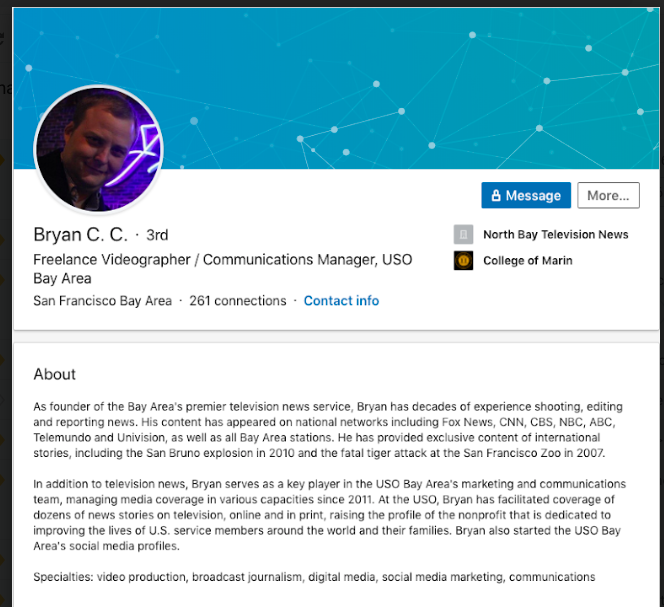
Newly unsealed court documents show the San Francisco Police Department Internal Affairs officers investigating departmental leaks were aware the target of a search warrant was a working journalist when they sought permission from a judge to raid his office.
A total of five search warrants were executed against freelance journalist Bryan Carmody, culminating with the May 10 raid of his home and office, as police investigated him for criminal conspiracy to steal a confidential police report about the death of Public Defender Jeff Adachi.

After initially defending the raid, Police Chief Bill Scott reversed course two weeks later and suspended the investigation. In a written statement, Scott said he was concerned the California Shield Law, which protects journalist from being forced to reveal sources, may have been violated.
Tony Montoya, president of the San Francisco Police Officer’s Association, blasted the chief in an open letter and called for Scott’s resignation. Montoya said the investigation was initiated by the chief, who knew of Carmody’s status as a journalist but failed to tell the sergeant who wrote the search warrant.
But the search warrant affidavit unsealed Tuesday makes it clear Sergeant Joseph Obidi was aware of Carmody’s profession. It said Carmody “makes a career out of producing/selling hot news stories” and “profits financially from every story he covers.”
A March 1 search warrant, which was unsealed last month, was much more ambiguous with how it referred to Carmody’s profession. That warrant, for cell phone records the night Adachi died, referred to Carmody’s LinkedIn profile on which he listed himself as a “Freelance Videographer,” which isn’t as explicit as freelance journalist. In that warrant, Obidi wrote that an internet search revealed Carmody was not currently employed by any of the news organizations which obtained the police report under investigation.
But not realizing Carmody was a journalist after viewing his LinkedIn profile stretches credibility. The “about” section of Carmody’s profile describes himself as “founder of the Bay Area’s premier television news service,” and that he has “decades of experience shooting, editing, and reporting news.”
Neither the March 1 search warrant for cell phone records nor the May 10 warrant for Carmody’s office mentioned that Carmody had a current SFPD press pass, which he’s held for more than 16 years.
The Chronicle reported last week that Michael Rains, at attorney representing Sergeant Obidi, said Obidi wasn’t aware the department had issued Carmody a press pass, and that if he had known, Obidi would have included that information in the warrant application.
Even if Obidi wasn’t aware of Carmody’s press pass when he filed the earlier warrants, there appears to have been no reason for him not to have known of the press pass by the time he sought the office warrant.
According to the office warrant affidavit, officers only learned about Carmody’s office after they raided his home and found mail with the office address on it. With Carmody still in handcuffs, Obidi applied for the office warrant and immediately executed it.
But at a workshop last month on the California Shield Law, organized by the Society of Professional Journalists, Carmody said when he was finally released, he discovered his press pass had been moved from his wallet where he normally keeps it.
“They took it out of my wallet, and it was sitting on my dresser,” Carmody told the audience. “So, they can’t say they didn’t know I was a journalist, and they can’t say they didn’t know I had an SFPD press pass.”
Rains did not immediately respond on Tuesday for a request for comment.
To date, judges have ruled to quash four of the five search warrants SFPD executed against Carmody. But judges have arrived at those decisions through very different means.
Judges Rochelle East and Gail Dekreon said they were not told Carmody was a journalist, and therefore the warrants were issued in violation of the California Shield Law.
But Judges Christopher Hite and Victor Hwang issued rulings that indicated their warrants were valid at the time they signed them. Both judges later quashed their warrants – but did so only because the probable cause they were based on included evidence from Judge East’s warrant, which is now inadmissible.
David Snyder – executive director of the First Amendment Coalition, which brought the motion to unseal the five warrants – said he believes that is a misreading of the California Shield Law.
“California Penal Code makes it clear no search warrant shall be issued for anything covered by the Shield Law – and that’s not qualified,” Snyder said. “Whether there is probable cause here is really irrelevant.”
Snyder also said there’s been no indication in the probable cause affidavits we’ve seen so far that Carmody committed a crime.
Search warrants for Carmody’s cell phone records show he communicated with two SFPD officers following Adachi’s death, and one of those officers was observed at Central Station, where SFPD believes the report was taken from. But it is not illegal for a journalist to receive leaked material from a source.
Carmody has also said his source cannot be identified from his cell phone records.
A ruling on the fifth search warrant is expected next week.

